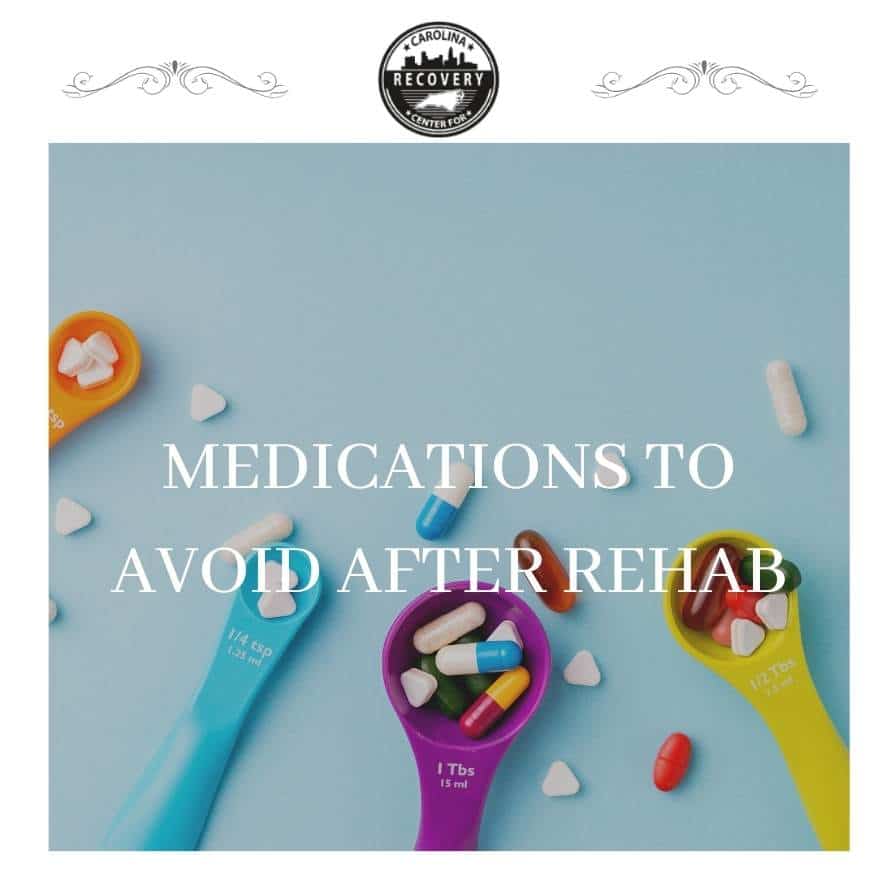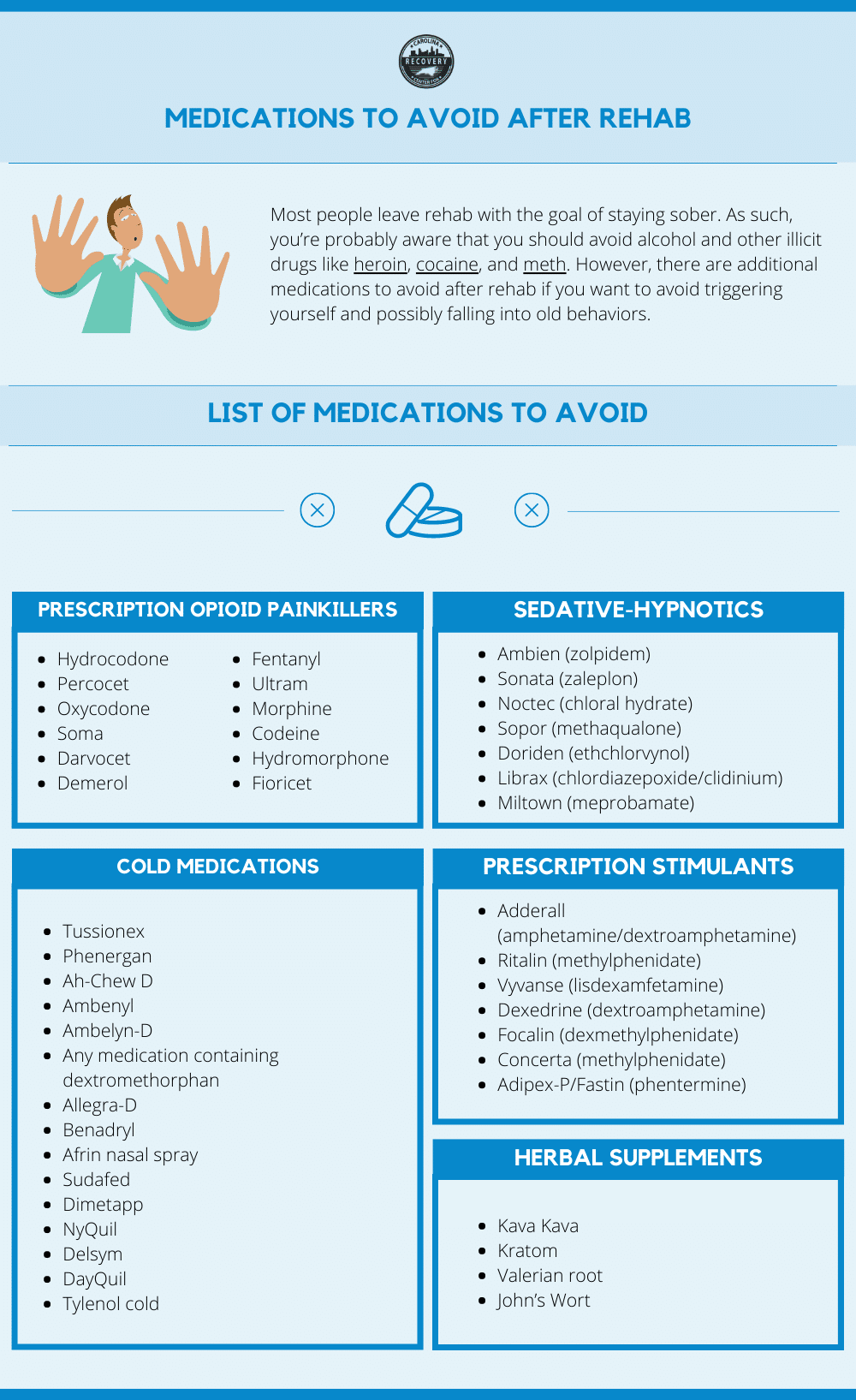Medications To Avoid After Rehab

Medically Verified: 2/1/24
Medical Reviewer
Chief Editor

All of the information on this page has been reviewed and verified by a certified addiction professional.
Most people leave rehab with the goal of staying sober. As such, you’re probably aware that you should avoid alcohol and other illicit drugs like heroin, cocaine, and meth. However, there are additional medications to avoid after rehab if you want to avoid triggering yourself and possibly falling into old behaviors.
Some of these medications are over-the-counter while others are only available by prescription. Moreover, many of the medications you should avoid after rehab are readily found in your medicine cabinet – you may not even be aware that they carry the potential for abuse or addiction.
Even if your doctor prescribes you a certain medication for legitimate purposes, it can make you relapse if you misuse it. Since you’ve already done the hard work in rehab, made it through detox, and have come this far, you need to be aware of which medications you should be wary of taking in recovery.

Prescription Opioid Painkillers
First and foremost, as a recovering addict, you should probably avoid taking prescription painkillers. Examples of pain medications that you should avoid due to their potential for abuse include:
- Hydrocodone
- Percocet
- Oxycodone
- Soma
- Darvocet
- Demerol
- Fentanyl
- Ultram
- Morphine
- Codeine
- Hydromorphone
- Fioricet
These opioid drugs are derived from opium – a powerful and sedating narcotic. Even when you use opioids as prescribed, using them for more than 5-7 days comes with a risk of addiction and relapse.
At the same time, pain that isn’t managed properly can lead to a relapse. So, if you absolutely must have opioids in recovery, it’s important to do so with caution. Ask a trusted friend to administer your medication for you and only take the amount that is prescribed.
Opioids are particularly dangerous in early recovery due to their overdose potential. People in early recovery will have lower tolerances, however, they may still try to take high doses of a drug. Doing so can easily lead to an overdose due to their decreased tolerance.
Sedative-Hypnotics
Sedative-hypnotics are depressant drugs that slow down the central nervous system (CNS). They are commonly prescribed for sleep disorders because they relax the mind and body. As such, they are also common drugs of abuse and a class of medications you’ll want to avoid after rehab.
Examples of sedative-hypnotics include:
- Ambien (zolpidem)
- Sonata (zaleplon)
- Noctec (chloral hydrate)
- Sopor (methaqualone)
- Doriden (ethchlorvynol)
- Librax (chlordiazepoxide/clidinium)
- Miltown (meprobamate)
Taking any of these medications, especially if not prescribed to you, may jeopardize your recovery.
Some Cold Medications and Antihistamines
At some point during your recovery, you will become ill with the cold or flu. And, your doctor may prescribe certain medications to help alleviate your symptoms or you may run to your local drug store for something over-the-counter.
It’s important to understand that some allergy and cold medications contain mood and mind-altering substances that can have a sedative or hallucinogenic effect.
Examples of allergy and cold medications to avoid include:
- Tussionex
- Phenergan
- Ah-Chew D
- Ambenyl
- Ambelyn-D
- Any medication containing dextromethorphan
- Allegra-D
- Benadryl
- Afrin nasal spray
- Sudafed
- Dimetapp
- NyQuil
- Delsym
- DayQuil
- Tylenol cold
As a general rule of thumb, if a medication says it can make you sleepy, contains pseudoephedrine or phenylpropanolamine, or is found behind-the-counter, it is something you may want to avoid.
Prescription Stimulants
Of course, stimulants like cocaine and meth are dangerous, but many prescription stimulants have similar chemical makeup and can be just as addictive. As a result, you should avoid taking stimulant medications after rehab.
Examples of popular prescription stimulants include:
- Adderall (amphetamine/dextroamphetamine)
- Ritalin (methylphenidate)
- Vyvanse (lisdexamfetamine)
- Dexedrine (dextroamphetamine)
- Focalin (dexmethylphenidate)
- Concerta (methylphenidate)
- Adipex-P/Fastin (phentermine)
While most stimulants are prescribed to treat ADHD, others, such as phentermine, are used to promote weight loss. Regardless of your intention, you should probably stay away from prescription stimulants in recovery.
Herbal Supplements
Aside from prescription and over-the-counter substances, there are also some herbal supplements you may want to avoid taking if you are in recovery. While many of these can be safe when used correctly, it is not worth risking your sobriety due to their mood and mind-altering effects.
Some herbal supplements you should stay away from include:
- Kava Kava
- Kratom
- Valerian root
- John’s Wort
If You’re Unsure of What Medications to Avoid After Rehab
By no means is this list exhaustive. There may be additional medications that you’ll want to avoid in recovery. On the other hand, some of these medications may be necessary for you. If that is the case, you need to take the appropriate measures to be sure you are taking your medications properly.
If you’re not sure whether or not a medication is safe to use, you should consult with multiple people. First, consult with your doctor about the dangers of the medication. If there is a risk for abuse, speak with your sponsor, counselor, recovery coach, and/or a trusted friend to come up with a plan of how you can safely take a medication you need to take without risking your recovery.
Whether you’re in recovery and need help staying on the right track or you’re interested in getting started on your sobriety journey, contact us today at Carolina Center for Recovery.

